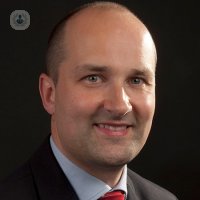I have a neck lump. What happens now?
Written by:Neck lumps can be benign or a sign of head and neck cancer. Patients with neck lumps are often seen by ear, nose and throat surgeons; as the cause of neck lumps commonly relates to the throat or the thyroid/salivary glands. Mr Hughes, a consultant ear, nose and throat surgeon, explains what you should do and what to expect if you have a neck lump.

When should I see a specialist about my neck lump?
Any neck lump should be investigated, especially if it’s present for more than two weeks. While some lumps are benign, it’s safer to assume the lump is a sign of something more serious, such as head and neck cancer, and to get it checked to rule out cancer as soon as possible. If a cancerous lump is left too long, it can be more difficult to treat.
What will I be asked during my appointment?
When we look at neck lumps, we ask a set of questions:
- how long you’ve had the lump for
- if it appeared suddenly or gradually
- if the lump is painful or painless
- if you have specific head and neck symptoms that are often associated with neck lumps
- if you have problems swallowing (dysphagia)
- if you have voice problems (dysphonia)
- if you have any mouth ulcers
You’ll be asked about symptoms regarding the rest of your body:
- night sweats
- weight loss
- loss of appetite
You’ll also be asked about your medical history and lifestyle. In particular, if you smoke tobacco, drink alcohol or chew paan/betel nut. These are major risk factors for head and neck cancer.
How will I be examined?
Aside from asking questions, we also carefully examine patients with neck lumps. This is done by looking inside the throat and mouth. Usually, head and neck cancers arise in the throat or mouth then spread to the lymph glands in the neck, leading to a neck lump.
Part of the assessment includes endoscopy of the throat. This involves inserting a thin tube with a light and camera through your nose to see inside it. Depending on the symptoms discussed and the examination findings, further investigations are requested including a biopsy of the lump, often under ultrasound guidance, and cross-sectional imaging, usually a CT scan or MRI scan
What if the lump is benign?
Often, we recommend removing benign lumps as they can cause local pressure symptoms, look unsightly or have a long-term risk of cancerous changes. Some lumps may be left and monitored, depending on the risks of removing it. Factors such as a patient’s age and general health influence this risk.
What if the lump is not benign?
If the neck lump is found to be caused by head and neck cancer, you will be referred to a head and neck cancer MDT. This is a multidisciplinary team of experts who will consult with each other to determine the best course of treatment for you. Depending on their recommendations, you might need an operation, chemotherapy, radiotherapy or a combination to treat the cancer.
Sometimes neck lumps are caused by lymphoma (blood cancer). If this is the case, you will be referred to a haematologist. This is a specialist in the field diagnosing and treating conditions concerning blood.
Can the lump come back after treatment?
Yes, unfortunately. If you have a cancerous lump that is cured, you’ll be monitored for at least five years after treatment to make sure it doesn’t come back or to catch it early if it does come back. This will involve clinical examinations and surveillance scans.
Visit Mr Hughes’ profile to book your first consultation and learn how he can assist you with your ear, nose, throat and neck health.


